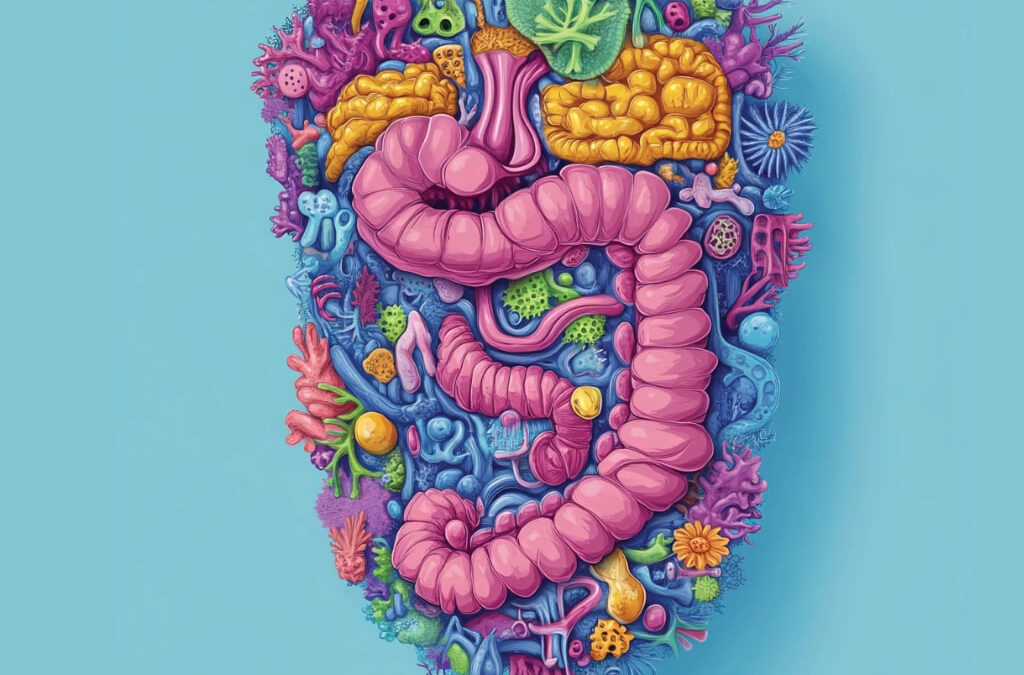
How Your Gut Microbiome Loves Going Vegan
How Your Gut Microbiome Loves Going Vegan
Switching to a vegan* diet? Sure, you may call it a lifestyle choice. But when you start to feel your energy return, excess weight drop, and even reversals for the better in blood test results, you may find yourself getting hooked on better health. The major influence that a whole foods, plant-based diet can have on your overall well-being is in the transformation of your gut microbiome, making your digestive system happier and healthier.
Let’s dive into how plant-based eating enhances your lower gastrointestinal tract, supports long-term perks of healthy digestion, and specific gut-friendly foods. I will also share with you the ill effects of indulging in meat, and the magic of probiotics to keep your gut flora balanced and robust.
* When I use the word ‘vegan’ I want to be clear that I’m referring to a whole foods, plant-based diet.
The Vegan Diet and Your Gut: A Love Story
I lived with my mother in her later years. She suffered from irritable bowel syndrome, a common disorder that affects the gastrointestinal tract. At that time, her doctors knew practically nothing about the illness, and gave her less than useful advice. The daily medications prescribed masked her symptoms but had no redeeming qualities for curing her condition. She continued to suffer from diarrhea or constipation, bloating and abdominal pain. The doctors warned her against the very foods, like nuts and seeds, that help support a healthy gut. Not once did any professional tell her to stop eating hot dogs.
I wasn’t much help either at the time, as I knew little about a plant-based diet myself. I had not learned how a vegan diet affects your gut, sensitive to the microbiome diversity that feeds our overall health and well-being. And before the advent of the Internet, it was not so easy to find relevant information, either. As I got older and began to experience similar symptoms that my mom had suffered, I fell into worry if I were doomed to repeat history.
A few years later when I went vegan for ethical reasons (usually vegan refers to a lifestyle, not necessarily healthy eating), I discovered the beneficial side effects of eating plant-based whole foods – no more digestive issues for me, except when I jumped off the plant-based wagon. And given that I was not much of one to eat hot dogs – or other meat – anyway, the transition felt easy and, well, clean..
Fiber: Your Gut's Beneficial Bacteria Boost
Going vegan means naturally loading up on fiber, the unsung hero of gut health. Fiber acts as a prebiotic, feeding good bacteria like Bifidobacteria and Lactobacilli. These little guys keep your gut balanced and your body happy.
With a a fiber-rich , your body ramps up the production of short-chain fatty acids (SCFAs). These are gut superheroes, reducing inflammation and boosting digestion. A plant-based diet sets the stage for beneficial bacteria to flourish.
Microbial Diversity Galore
A diverse vegan diet means a diverse gut microbiome. This diversity is linked to a stronger immune system and overall better health. Fruits, veggies, grains, and legumes provide the nutrients needed for a robust microbiome. According to a systematic review, several studies have identified a link between plant-based diets and the decreased risk of developing cardiovascular diseases, obesity, and other health issues. Read more about the effect of plant-based diets on gut microbiota here at the PubMed Central Archives..
The Occasional Meat or Fish Slip
What if you sneak in some meat or fish? If your body is regularly accustomed to plant-based, whole foods, then straying from that diet, may trigger some issues. Here’s what might happen:
- Digestive Discomfort. Your body might protest with bloating or an upset stomach. It’s just not used to those animal proteins and fats anymore.
- Microbiome Shuffle. Your gut microbiome might do a little dance to adjust to the new arrivals, with cramps or gas. This shift is usually temporary.
- Inflammation Alert. Some folks might experience inflammation. Your gut needs a moment to recalibrate and get back to its happy place.
Long-Term Benefits of Going Vegan
Gut Health: The Long Game
Stick with a vegan diet, and you’ll likely see sustained gut health improvements. Fiber-rich foods help beneficial bacteria thrive, keeping your gut in top shape. Remember, we are talking about a plant-based, whole foods plan, not switching from processed foods to other processed foods, just because they are cruelty-free. When i think cruelty-free, i also think about treating myself in a cruelty-free way – more fresh produce and healthy grains, less junk food.
Lower Risk of Chronic Diseases
A healthy gut can lower the risk of heart disease, type 2 diabetes, and even some cancers. A vegan diet helps reduce inflammation and improve metabolism. While many sources are ick to say that more studies are needed, studies so far have proven that greater adherence to a healthful plant-based diet has been associated with a lower risk of mortality, cancer, and particularly cardiovascular disease. [Source]
A diverse microbiome means a stronger immune system. Long-term veganism can help your body fend off infections and illnesses. There's growing evidence that a healthy gut can boost your mood and cognitive function, too, potentially reducing anxiety and depression. I will report on this in a separate post – some controversy around these topics deserve a closer look.
Foods That Love Your Gut
- Leafy Greens. Spinach, kale, and Swiss chard are packed with fiber and nutrients, promoting healthy gut bacteria and reducing inflammation.
- Legumes. Beans, lentils, and chickpeas are fiber and protein powerhouses, supporting digestion and feeding good bacteria.
- Fermented Foods. Sauerkraut, kimchi, and tempeh are loaded with probiotics, introducing beneficial bacteria to your gut.
- Whole Grains. Oats, quinoa, and brown rice offer soluble fiber, maintaining a healthy gut lining and encouraging good bacteria growth.
- Fruits. Berries, apples, and bananas are fiber-rich and full of vitamins, creating a healthy gut environment.
- Nuts and Seeds. Almonds, chia seeds, and flaxseeds provide fiber and healthy fats, supporting gut health and reducing inflammation.
Probiotics: The Gut's Secret Weapon
Probiotics are live microorganisms that bring health benefits. They help maintain a balanced gut, aid digestion, boost immunity, and reduce inflammation.
Getting Your Probiotics Fix
- Fermented Foods/Plant-based Probiotics: Enjoy dairy-free yogurts, kombucha, sauerkraut, and vegan kimchi. Try coconut or nut milk yogurts and fermented soy products like miso.
- Probiotic Supplements: These come in various forms and can help you get your daily dose of good bacteria.
Want to know how to care for your gut with a vegan diet?
Going vegan can transform your gut microbiome by boosting fiber intake, enhancing beneficial bacteria, and promoting diversity. While the occasional meat slip might cause temporary discomfort, a plant-based diet supports a healthy gut in the long run. Embrace specific foods and probiotics to further optimize gut health, leading to better digestion and overall well-being. Living a vegan lifestyle might just be the key to a healthier, more balanced life.
++++++++++++++++++++++++++++++++++++++++
Why do some thrive on a vegan diet while others fail? Find out why here.






